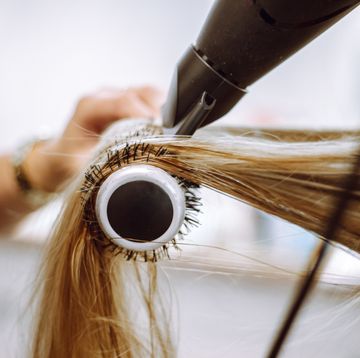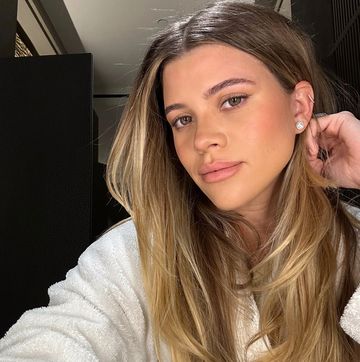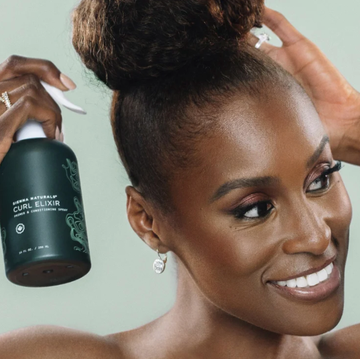The past eight months have required an excruciating amount of tenacity as we grapple with the coronavirus pandemic, political uproar, and racial inequality. Sometimes all in a single day. As waves of Black Lives Matter movements continue to wash over the country, a coalition of organizations, politicians, and beauty executives has been working on an issue tethered to the pursuit of Black freedom and the eradication of systemic racism before 2020 thrust it front and center: the protection of Black hair.
On September 21, the House of Representatives passed The CROWN Act, a law that seeks to ban hair discrimination Black people may face due to the natural texture of their hair, or while wearing protective styles like locs, braids, twists, and bantu knots. This wasn’t the first time the bill had been introduced at the federal level. On December 5, 2019, Senator Cory Booker introduced The CROWN Act in his chamber as well. The prospect of a federal law protecting Black hair now sits in the Judiciary Committee of the Republican-controlled Senate.
Waiting on the federal government is a fool’s errand, which is precisely why Black women, men, and youth have taken to their local government chambers to testify about their own experiences of hair discrimination as they’ve navigated school, work, and sports, in an effort to get The CROWN Act bill passed in their own states.
The heart of the bill drives home the specific discrimination Black people face because of the natural texture of their hair, which tends to be kinky, coily, and curly. Critics say the bill’s flaw is that it’s not only Black people who face discrimination in the workforce based on their hair. Yet a study conducted by Dove, which is a founding member of The CROWN Act Coalition, found that Black women are 83 percent more likely to report being judged more harshly on their looks than other women. Black women are also 30 percent more likely to be made aware of a workplace appearance policy, and those with locs, twists, or braids are deemed less professional and are less likely to land job interviews. In a 2014 study, about a third of the Black women surveyed said that they’ve faced disrimination because of wearing their hair in its natural state.
Versions of The CROWN Act have passed in California, New York, New Jersey, Virginia, Washington, Colorado, and Maryland. But efforts have not been successful in other states. In August, for example, the bill was vetoed by Nebraska governor Pete Ricketts. And in February, the senate bill was rejected in West Virginia by the House Judiciary Committee.
California was the first state to pass The CROWN Act in 2019, led by State Senator Holly Mitchell. “Policymakers are people too, and implicit and explicit bias doesn't discriminate based on what you do for a living,” Mitchell tells BAZAAR.com. “As a Black policymaker, I experience that as we’re debating in committee on the floor, not only The CROWN Act but any number of bills that are attempting to provide redress or call out white supremacist ideology that impacts the lives of Black people every day.”
Although Congress has continued to grow in racial diversity over the years, it’s still disproportionately white. One in five members of the Senate and House of Representatives are ethnic or racial minorities. The Senate has seen only 10 Black senators in America’s history. Twelve percent of the House members are Black, which is almost equal to the percentage of Black Americans. When our elected officials look like their constituents, laws get passed that lift up and protect all Americans regardless of race, gender, or economic status.
Mitchell acknowledges that senators hear hundreds of bills a year and are not experts on every issue. She hopes that in the case of The CROWN Act, her colleagues can trust her expertise as a policymaker and a Black woman. Mitchell believes it was a perfect storm of factors that ushered in a successful passing of The CROWN Act in California. One factor being herself. “I felt that because [I have locs], I would be the perfect person to talk about it. And also to give my sitting colleagues a frame of reference that they could take it from me, their sitting colleague, that I'm no less professional because of how I choose to wear my hair as an elected official,” she says.
Mitchell’s bill set a precedent and created a framework and cadence that other politicians across the country could follow to present The CROWN Act in their own states.
News of the bill’s passing in California piqued the interest of Machaela Cavanaugh, who is Nebraska’s sixth district senator. In January, she introduced LB 1060 as an amendment in the Nebraska Fair Employment Practice Act. At a Judiciary Committee hearing in June, more than a dozen women told stories of struggling to navigate work and school in their own communities due to their hair. Cavanaugh recounts people shouting, “Testify!” literally, as testimonies were read.
“I never second-guessed for a moment that it wasn't an issue. But hearing the stories firsthand from people who have been impacted by this type of discrimination was really moving to me,” she says. “That’s why I chose it as my priority bill. After that hearing, this just seemed like what had to happen in Nebraska.”
On August 11, the bill passed 27–12 after a second Final Reading in the Nebraska Legislature and was sent to Governor Pete Ricketts’s desk, where it was promptly vetoed.
Nebraska’s version of The CROWN Act had bipartisan support—so what happened? The legislation’s failure at the final stage raises questions about why some politicians are hesitant to vote for a bill designed to protect Black people from a history of well-documented race-based hair discrimination.
Cavanaugh’s fight to get LB 1060 was unusual. At the request of Speaker of the Legislature Jim Scheer, Cavanaugh was asked to receive a formal opinion from Attorney General Doug Peterson two days before the final hearing. This was rare, as it normally takes a couple weeks or months to receive a response.
After a flurry of phone calls, Cavanaugh received a response from Peterson just in time. “The attorney general could not issue an opinion, because there wasn't actually a legal question,” notes Cavanaugh. Instead, Peterson offered a recommendation: Strike the section that seeks to define race in the Nebraska Fair Employment Practice Act. Race is not a specifically defined term in the act, but a group of characteristics. Cavanaugh’s amendment then made race “inclusive of hair texture and protective hairstyles.”
In addition, Cavanaugh sought an opinion from Marna Munn, the executive director of the Nebraska Equal Opportunity Commission, specifically regarding concerns that the amendment would affect policies regarding “health and safety” within the act. Munn agreed in her testimony that these health and safety policies would not be impacted by this bill: “It's something we're adept at looking at and analyzing, and it presents no concerns to us in terms of analysis.” The employee’s hair would still need to be pulled back so as to not interfere with machinery, for example, no matter the person's race or hair texture.
These amendments were made and read during the second Final Reading. Still, in his veto statement, the governor said that although he agrees with the intent of the bill, "LB 1060 would add a new definition of ‘race’ that would apply in all discrimination cases arising under the Nebraska Fair Employment Practice Act,” a factor Cavanaugh specifically aimed to prevent prior to it landing on Ricketts’s desk.
Ricketts’s veto continued “While I agree with the goal, I object to the form of the bill. It needs to add protections for employees based upon their immutable hair texture and to also add protections for employers centered on health and safety standards.” Health concerns were addressed before the bill’s second Final Reading.
The governor's statement lacks fundamental understanding. The bill is ensuring that if two people of different races both have similar hairstyles (locs, for example), one is not told to change theirs due to bias or racism from their employer. Both employees still need to tie their hair back for health and safety reasons currently outlined in the act. When asked for additional comment and clarification of his statement, Ricketts’s office did not respond.
Senator Cavanaugh’s next step is to reintroduce the bill on the first day of session in January. In addition, she will introduce a second bill that protects students from hair discrimination in schools, which will go to Nebraska’s Education Committee.
In West Virginia, The CROWN Act was originally presented in the House by Delegate Danielle Walker on January 23. Just a month earlier, 14-year-old Matthew Moore was told by his varsity basketball coach to cut off his dreadlocks or get benched. His story rightfully went viral in West Virginia.
Moore’s pain felt familiar to Walker, a Black woman. “I can only imagine how he felt in that locker room, trying to comb out the natural state of his hair,” Walker tells us. “The trauma and the emotional roller coaster of, ‘You don't fit in this box. So you must modify yourself regardless of your skill.’” Although Moore’s story caught attention in the community, HB 4508 went untouched in West Virginia’s House.
Another version of the bill, SB 850 was then presented by West Virginia’s Senate Judiciary Committee, currently led by Republican senator Charles Trump. Moore’s story came to Trump (Charles, not Donald) by way of a meeting with ACLU West Virginia's policy director, Eli Baumwell. Moore’s mother attended that meeting, and it spurred Trump to put the bill on the agenda for debate. The bill was also supported by West Virginia University's Student Government Association.
“[Moore’s mother] was compelling. We put the bill together and got ready for a committee meeting. When we had the committee meeting, she came and she brought her son. He was as impressive to me as she was,” Trump says. “I think the committee was pretty moved by their story.”
A Black student and his Black mother shouldn't have to impress politicians in order to get race-based discrimination legislation passed. But it worked: SB 850 passed 32–2, and it headed to the Judiciary.
The House Judiciary Committee motioned to discharge the bill 55–42, meaning they refused to vote on it. Chair of the House Judiciary Committee John Schott did not return a request for comment. Trump suspects the bill will be reintroduced early next year.
As the federal government struggles with basic duties like protecting Americans during a pandemic, local legislatures hold the power to move the world closer to justice and push for bills that aim to eradicate systemic racism in all walks of life. It’s up to the American people to speak up and let their legislators, both state and federal, know that they support The CROWN ACT. Until it becomes the law of the land, race-based hair discrimination will continue to be used as a tool to undermine Black people’s validity in all spaces.

Darian Symoné Harvin is a reporter and news curation editor covering beauty at the intersection of politics and pop culture. She writes the newsletter BEAUTY IRL, which is an extension of her work across various publications. Darian grew up in Buffalo, New York, and lives in Los Angeles.













